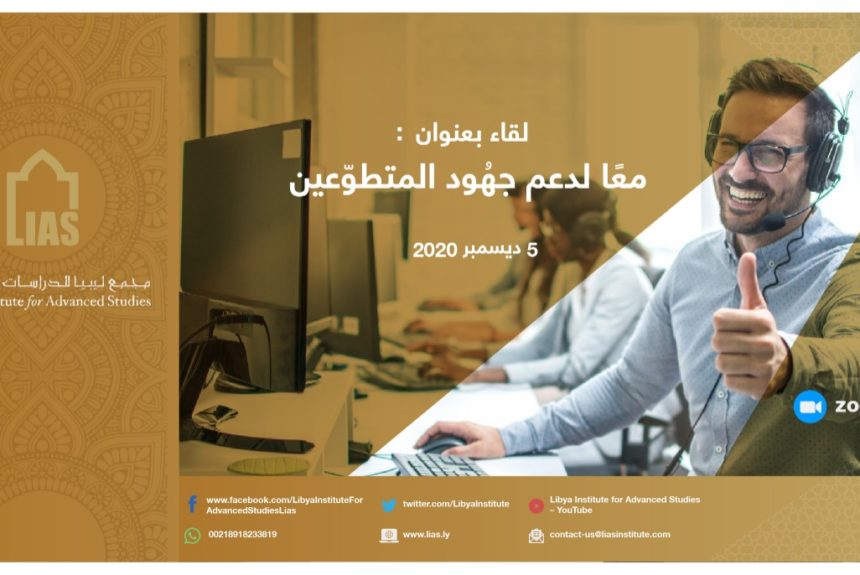On Saturday, December 5, 2020, the Libya Academy for Advanced Studies organized a meeting via the Zoom platform, entitled: Together to support the efforts of volunteers, on the occasion of International Volunteer Day.
The meeting focused on talking about Libyan youth experiences, initiatives, and actions during and before the Corona pandemic.
The meeting was moderated by Mr. Jamal Al-Falah, and a group of young, creative volunteers from various cities in Libya participated in the meeting.
Mr. Haitham Bin Lamah spoke about the distinguished efforts undertaken by the Al Salam Charitable Society, Bani Walid.
Professor Mabrouka Al-Khair also spoke about her volunteer initiative regarding education, and she is the founder of the Libya Educational Salon, which is diverse for eradicating illiteracy and caring for children. About two thousand trainees were trained through this initiative.
Then d. Al-Mahdi Al-Shafi’i from Sebha, a student in human medicine, spoke about volunteer work and his journey since his childhood with volunteer work, and his work in raising awareness of issues of social violence, and issues of health awareness, especially regarding AIDS, in addition to establishing the Fezzan Qaymar team, from various tribes and neighborhoods in the city. Sabha, through a periodic arrangement in electronic games. He and his colleagues also established important awareness about Covid-19 electronically and also trained nurses in health centers.
Mr. Sufyan Al-Dabib, a civil activist from the city of Bani Walid and head of the Libya Foundation for Cultural Development, touched on the issue of volunteerism, altruism, and goodness, to support the weak, raise awareness, social peace efforts, and support medical teams during the Corona pandemic, through awareness and cultural support.
Professor Abdul Qadir Al-Najdi, a doctoral student in geology in America, founder and member of associations in the Green Mountain region, also participated. He pointed out the complete lack of awareness of volunteer work. He also pointed out the presence of volunteer work in the curriculum in America, in addition to recording the number of volunteer hours. He hoped that Benefiting from this experience in our institutions and universities, and for this culture to prevail, concluding that the future of Libya depends largely on volunteer work.
Educational trainer Aisha Al-Barki also focused in her intervention on volunteering, its importance, its humanitarian and religious purposes, its role in education and training, and training, accustoming and encouraging students to do so.
The intervention of Mr. Issam Al-Mukhtar, Chairman of the Board of Directors of the Mediterranean Organization for Development and Relief, came to talk about volunteer work, and that its nature is that it makes others happy and draws happiness on their faces. He conveyed his greetings to the Scouts, the Red Crescent, and the White Army resisting the pandemic, and talked about their efforts in the campaign to introduce Covid-19, in cooperation with the University. Sabratha, in the municipalities of Al-Zawiya, Sabratha, Sorman, Zaltan, and Riqdalin, in three languages, the campaign targeted migrants in shelter centers and their locations.
The intervention of Mr. Raafat Al-Sifaw – a member of the Sawaed Development Foundation in Tandemira and the Fasato Foundation for Development in Jado – was about their organization volunteering to monitor the municipal elections in the municipality of Kabao, Al-Haraba and Jado, and currently they are seeking to monitor in the municipality of Tripoli, the Andalus and Al-Rajban neighborhoods, and preparing programs to integrate young people into political work, and addressing the reluctance to Youth about political action.
Then, Professor Safinaz Mahjoub, a professor at Omar Al-Mukhtar University and executive director of the Women’s Association for Orphan Care in the city of Derna, intervened and highlighted the role of volunteering in supporting and serving governmental and private institutions, how to increase the love of volunteering among young people, and the need for government institutions to provide an advantage, a simple bonus, or a promotion. For volunteer people, and taking care of volunteers by appointing them, supporting them, and praising them.
The intervention of Mrs. Enas Al-Salhi, President of the March 21 Children’s Foundation, focused on referring to the work of this organization in reducing violence and abuse against children, training teachers and workers on childhood, and providing psychological and social support to children. She also spoke about the problems of understanding volunteer work, and the misunderstanding of volunteers, because volunteers They offer their work, time and money for volunteer work, and she pointed out the importance of raising awareness of volunteer work, its rules and tools, and its benefits and enjoyment.
Mr. Tariq Al-Warfalli, a civil activist from the city of Derna, also spoke, and pointed to the issue of development and the attempt to exploit it for private purposes, the problem of registering organizations and their lack of presence on the ground, and the absence of conditions and goals for some organizations, because volunteer work is a noble humanitarian work that should not be exploited.
Journalist Idris Ahmeed from Sabha – one of the founders of the local Radio Sabha – concluded the meeting by talking about the culture of volunteering and its roots inherited from fathers and grandfathers, the impact of people’s preoccupation with its problems on the weakness of volunteering and the culture of support, and the efforts of the media and Radio Sabha in awareness and education during the Corona pandemic.
To watch the meeting, please click on this link.
To watch the report of the Libya TV channel, its homeland, about the meeting.


